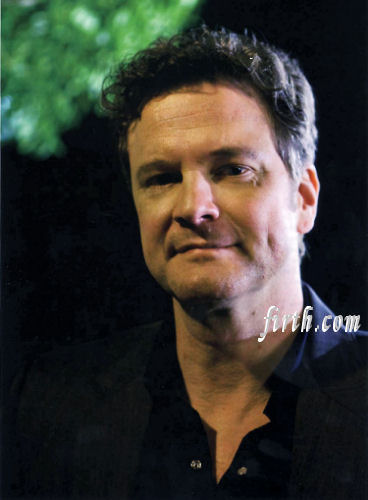The second thing you notice is his hands, of all things. Impossibly baby soft. They’re perhaps exactly what you’d expect from a guy known for playing sensitive leading man roles, but not altogether in keeping with the hard-boiled Texan he plays in Main Street, the independent film based in the Bull City that brought Firth here for several weeks. The third thing you notice is, simply, his face. Kind and stately with to-die-for dimples. Although we are almost exactly the same age, he has hardly any crow’s feet or age spots. I thought for a second about asking to interview his make-up artist instead. 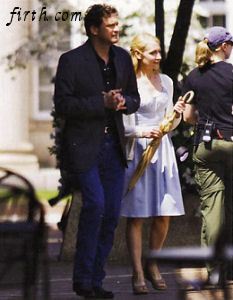 Oh,
right. The interview. That’s why I’m standing here at the corner of
West Main and Corcoran, the streets [sic] wet after a fake rain storm
conjured by the film crew for a nighttime shoot. The film has generated
quite the buzz since production began in April, in good ways and bad. Oh,
right. The interview. That’s why I’m standing here at the corner of
West Main and Corcoran, the streets [sic] wet after a fake rain storm
conjured by the film crew for a nighttime shoot. The film has generated
quite the buzz since production began in April, in good ways and bad.It’s been a thrill to have Firth and his co-stars—Orlando Bloom, Ellen Burstyn, Patricia Clarkson, Andrew McCarthy and Amber Tamblyn—here in Durahm. We can’t help but swell with pride when we hear how much these accomplished actors have enjoyed many of our favorite restaurants and attractions. And the photo that circulated around the local blogosphere with Bloom wearing a Durham Police Department uniform was a trip. The movie itself is a bit of a different story. The script, penned by the late great screenwriter Horton Foote, was written after he visited downtown Durham five years ago. That was before downtown revitalization had really taken hold. He called it Main Street because he happened to notice one day he was the only person driving along our Main Street. The movie is about people in a down-and-out town who have to decide how much they’ll compromise to put some money back in their pockets. Some are worried it won’t portray Durham in a positive light, or even an accurate one. The irony, of course, is that while the film seems altogether timely during the current economic crisis, it doesn’t accurately reflect the state of things in the city where it’s set. Durham’s thriving, relatively speaking, and I’d wager Mr. Foote wouldn’t recognize Main Street Durham as it is today. I discussed all this with Colin standing on the street corner, and I found his answers to be genuine and thoughtful. We’ll get to them in just a bit. But the story of how little old me wound up on that street corner talking with a star? That’s a tale worth telling in itself. The real secret: good cooking and Southern hospitality. The day after Easter, I phoned the film’s publicist, David Linck, a very friendly PR guy from Los Angeles who has worked on more than 70 films. I said we would love to do a piece on the movie for Durham Magazine. “I can have you come down to the set one day and you can take some pictures.” David replied. Great, a foot in the door. OK, maybe just a toe. The next week, myself, Senior Editor Noor Shehzad and Photographer Briana Brough headed down to Parrish Street to hang around the set, along with about 10 other media outlets. Having been raised by Southern parents, I did not show up at this movie set empty-handed. I made a batch of raspberry streusel nut muffins and wrapped just two in a small box with my card inside. I met David for the first time in person. He was friendly, but non-committal. I sensed this was not the time to tell him I want to interview Colin. I handed him the box of still-warm, fragrant muffins. “I just wanted to welcome you to Durham,” I said. David took them and gave them over to a nice woman standing next to him, who he introduced to me as his wife, Rose. We got to talking, and then I did what all good Southerners do with folks new to town: invited them over for dinner. Rose looked at me like I had two heads. I guess because they aren’t often invited to strangers’ homes for dinner. But then again, she had never been to Durham before. She said she would ask David and we left it at that. The next day Rose e-mailed me that they would love to come to dinner. I invited two other Durham couples to show our guests a little bit of Durham’s real hospitality. I was thinking that perhaps David would have extra incentive to get me a meeting with Colin, once he had a taste of my green peppercorn chicken and herb-crusted onion tart. David—sans Rose, who had fallen ill—arrived at our house and spent the next 4 hours sitting on our terrace on a perfect, just-warm-enough night. As we enjoyed our dinner, he regaled us with hysterical stories of working on Talladega Nights and Bull Durham. At the end of the evening he invited everyone there to come down to the set one day to watch the filming. He then asked me what I wanted for the magazine. “I want to interview Colin Firth,” I said with some trepidation. There I stood, holding my breath. He smacked his lips together, cocked his head to one side and said, “I can try, but I am the publicist for the movie, not the stars. They have their own people who keep very tight control over them.” Monday he called. “Rose and I want to take you to lunch,” he said. A welcome surprise. We were developing a friendship, so we went to lunch at Toast, and I never brought up the Colin issue. David invited me and my friends to come to the set on Thursday night, when Colin was going to be filming. Dark fell over the city, creating the perfect environment for the scene they were shooting that night. An office building had a lit-up “hotel” sign placed on it and a sheriff’s car sat in front. A water truck sprayed the street, which reflected the lights from the buildings. A small crowd gathered on the corner opposite the film set, with two real Durham cops keeping the fans in place. David did his best to make sure I didn’t leave the set with nothing. He brought over the movie photographer, the director’s life partner, one of the 25-year-old producers. All very nice people. I interviewed each of them about how Durham had been treating them. “Unbelievable...nicest people on earth...best restaurants, loved Watts Grocery, Revolution, Rue Cler, Piedmont, Raverna Nikos. “Would you like to shoot another movie in Durham?” I asked. “I would shoot every movie in Durham. The city, the police and the public have been so nice.” There it was. We are “so nice.” True enough, but we know that. It’s why we live here. Not exactly a story. (At least it was not a story for Durham Magazine. Perhaps it’s a story for Best Film Locations Quarterly.) I was beginning to lose hope. It was very dark and cold now. From the “Crew Only” zone, David signaled me to cross the street to meet a small woman with wild strawberry blonde hair. I knew her. She was Hallie Foote, Horton Foote’s oldest daughter. I had gone to college with her younger sister, Daisy. We started to talk about Daisy and their father. Hallie told me how, even though he died ten days short of his 93rd birthday, he was still writing right up until the end. She was thrilled that Main Street, his last completed screenplay, was being made. Hallie and I were able to watch Colin do take after perfect take, not 10 feet away from us as we visited. I was fairly sure that this was as close to him as I was going to get. I was thinking this just as Colin Firth suddenly walked right up to me. 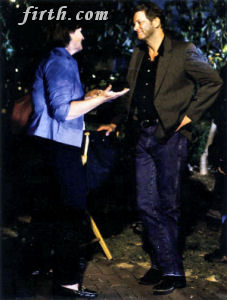 I must have held my hand out because he
was much to [sic] gentlemanly to have just grabbed it, but I certainly
don’t remember. I heard David’s voice, “Colin, this is Dana from Durham Magazine.” I must have held my hand out because he
was much to [sic] gentlemanly to have just grabbed it, but I certainly
don’t remember. I heard David’s voice, “Colin, this is Dana from Durham Magazine.”I managed to spit out, “Mr. Firth, It’s nice to meet you. Thanks for taking time between takes to talk with me. Have you enjoyed Durham?” He gave me a big smile. “Durham has been wonderful,” he told me in that perfect British schoolboy accent. “I love the downtown where we have done most of the shooting, but I am amazed that when you go one mile in any direction, it is like paradise.” I was not about to disagree. There he stood in his blue tattersall western shirt, with the little snaps instead of buttons and a cowboy blazer. In the movie he portrays a not-so-nice Lone Star stater who wants to exploit Durham, but that character was in such contract [sic] to this very kind and engaging Brit standing before me. “My family was here for a week and my kids loved it so much, they begged to come back during summer break.” “What did you do with your kids?” I asked. Colin went on to tell me about how they visited the Eno River State Park, a Bulls game (which his youngest son just did not understand), the Duke Lemur Center and the Museum of Life and Science several times. “The place I was most surprised about that my 8- and 6-year old sons liked as much as I did was the Nasher Museum of Art. We have friends here, and our kids played together and there was just enough time to do all the things we wanted to do.” Thrilled that we both agreed how great Durham is, I had to ask the big question: “How is Durham going to be portrayed in the movie?” Colin looked down at me and, after a long pause, said, “That is up for interpretation. Ellen [Burstyn] and I both see it in different lights and have played our roles from those different points of view. I’m a little ambiguous if it portrays Durham as the wonderful place it is now, but it is a timely piece because it mirrors what is happening economically all over the world now, with car companies closing in Britain, like here.” 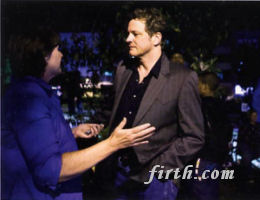 As we talked on the sidewalk, I could
hear the bustle of people working, moving cameras and booms setting up
the next shot, but Colin never took his eyes off of mine. I almost
wished he had for just a moment so I could take a breath. He easily
could have told me at any time that he was done, or looked around
indicating boredom, but he didn’t. “What made you want to do this
film. I know it’s not for the money?” I ventured boldly. As we talked on the sidewalk, I could
hear the bustle of people working, moving cameras and booms setting up
the next shot, but Colin never took his eyes off of mine. I almost
wished he had for just a moment so I could take a breath. He easily
could have told me at any time that he was done, or looked around
indicating boredom, but he didn’t. “What made you want to do this
film. I know it’s not for the money?” I ventured boldly.He laughed and threw back his head. “You can say that! But it is a great story and one that I am thrilled to be part of. Being in Durham has been a bonus and a great surprise.” “What do you think makes this a great story?” “It is not an escapism movie, which do have their place, but this is not one of them. In Main Street I play a guy who is offering Durham an economic boom, and all they have to do is allow a hazardous waste plant to be put here. It is not a black and white story. Not all stories always have happy endings, but they still need to be told. Real life is more complicated, and this is more like real life,” he said. I pushed a bit harder: “Based on what you have read and shot so far, how do you think people will view Durham based on the movie?” He cocked his head to one side and leaned in closer to me. His eyes took on that sad look as if he was about to tell me the truth about Santa but didn’t want to break my heart. “I don’t think they will flock here based on the movie.” He tried to soften the blow by adding, “Sometimes that is a good thing. The island where we shot Mamma Mia is an incredibly charming place, but very difficult to get to since you can only arrive by boat. They have a dilemma. The major wants to capitalize on its popularity from the movie and put a runway in, bringing in lots of tourists, but then is the island giving up the very thing that makes you want to visit?” 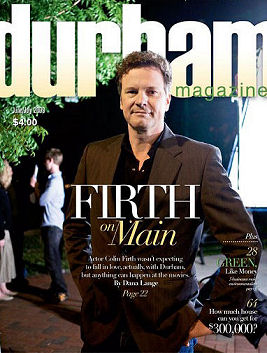 He raised a hand, palm outstretched
toward me, almost asking for my forgiveness. He raised a hand, palm outstretched
toward me, almost asking for my forgiveness.I let him off the hook. “I love Durham, and in lots of ways I don’t want the world to know how great it is. It might change us for the worse.” He nodded in agreement and gave me a small smile. Just then a voice from the dark called out “Rehearsal!” for the next shot. Clearly my time with Colin was getting short, but he did not make an attempt to leave me, still looking directly at me. “Well, we’re glad you did come to work here and hope you will come back,” I said. With a smile and a nod he replied, “I hope that we can come back and do a screening of the film when it’s done, because Durham has been incredibly generous to us, and I’ve enjoyed being here.” He’s either the best actor without a script or a genuinely good guy. “Thanks so much for being so generous with your time. It has been a pleasure to talk with you,” I said, reaching out to shake that soft hand of his one last time. “And you,” he said, with a nod of his head and a slight wink as he turns to walk away. And there I stood, alone in the dark, right on Main Street. |
